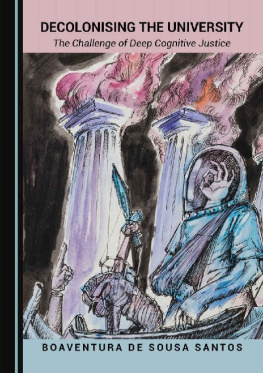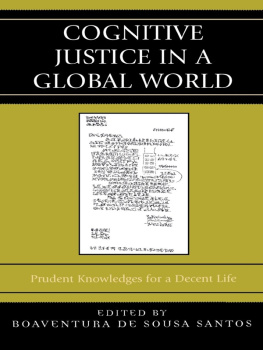Santos - The End of the Cognitive Empire
Here you can read online Santos - The End of the Cognitive Empire full text of the book (entire story) in english for free. Download pdf and epub, get meaning, cover and reviews about this ebook. year: 2018, publisher: Duke University Press, genre: Politics. Description of the work, (preface) as well as reviews are available. Best literature library LitArk.com created for fans of good reading and offers a wide selection of genres:
Romance novel
Science fiction
Adventure
Detective
Science
History
Home and family
Prose
Art
Politics
Computer
Non-fiction
Religion
Business
Children
Humor
Choose a favorite category and find really read worthwhile books. Enjoy immersion in the world of imagination, feel the emotions of the characters or learn something new for yourself, make an fascinating discovery.

- Book:The End of the Cognitive Empire
- Author:
- Publisher:Duke University Press
- Genre:
- Year:2018
- Rating:5 / 5
- Favourites:Add to favourites
- Your mark:
- 100
- 1
- 2
- 3
- 4
- 5
The End of the Cognitive Empire: summary, description and annotation
We offer to read an annotation, description, summary or preface (depends on what the author of the book "The End of the Cognitive Empire" wrote himself). If you haven't found the necessary information about the book — write in the comments, we will try to find it.
Santos: author's other books
Who wrote The End of the Cognitive Empire? Find out the surname, the name of the author of the book and a list of all author's works by series.
The End of the Cognitive Empire — read online for free the complete book (whole text) full work
Below is the text of the book, divided by pages. System saving the place of the last page read, allows you to conveniently read the book "The End of the Cognitive Empire" online for free, without having to search again every time where you left off. Put a bookmark, and you can go to the page where you finished reading at any time.
Font size:
Interval:
Bookmark:
THE END OF THE COGNITIVE EMPIRE
THE COMING OF AGE OF EPISTEMOLOGIES OF THE SOUTH
Boaventura de Sousa Santos
Duke University Press Durham and London 2018
2018 DUKE UNIVERSITY PRESS
All rights reserved. Printed in the United States of America on acid-free paper . Text designed by Courtney Leigh Baker.
Cover designed by Matthew Tauch. Typeset in Whitman and Futura by Westchester Publishing Services.
Library of Congress Cataloging-in-Publication Data
Names: Santos, Boaventura de Sousa, [date] author.
Title: The end of the cognitive empire : the coming of age of epistemologies of the South / Boaventura de Sousa Santos.
Description: Durham : Duke University Press, 2018. | Includes bibliographical references and index.
Identifiers: LCCN 2017059816 (print)
LCCN 2018000306 (ebook)
ISBN 9781478002000 (ebook)
ISBN 9781478000006 (hardcover : alk. paper)
ISBN 9781478000150 (pbk. : alk. paper)
Subjects: LCSH : Knowledge, Sociology of. | Social epistemology. | Social justiceDeveloping countries.
Classification: LCC HM 651 (ebook) | LCC HM 651 . S 245 2018 (print) | DDC 303.3/72dc23
LC record available at https:// lccn .loc .gov /2017059816
This book was developed in the context of the research project AliceStrange Mirrors, Unsuspected Lessons, coordinated by the author at the Centre for Social Studies of the University of CoimbraPortugal. The project was funded by the European Research Council, 7th Framework Program of the European Union ( FP /200713)/ ERC Grant Agreement n. [269807] (http:// alice .ces .uc .pt /en ). This publication also benefits from the financial support of the Portuguese Foundation for Science and Technology, under the Strategic Program UID / SOC /50012/2013.

Contents
We live in a period in which the most morally repugnant forms of social inequality and social discrimination are becoming politically acceptable. The social and political forces that used to challenge this state of affairs in the name of possible social and political alternatives seem to be losing steam and, in general, appear to be everywhere on the defensive. Modern ideologies of political contestation have been largely co-opted by neoliberalism. There is resistance, but it is less and less credible as a bearer of a realistic alternative. It occurs increasingly outside institutions and not through the modes of political mobilization prevalent in the previous period: political parties and social movements. Dominant politics becomes epistemological when it is able to make a credible claim that the only valid knowledge available is the one that ratifies its own dominance. In such an epochal Zeitgeist , it seems to me that the way out of this impasse is premised upon the emergence of a new epistemology that is explicitly political. This means that the reconstruction or reinvention of confrontational politics requires an epistemological transformation.
Writing in 1845, Karl Marx ends the Theses on Feuerbach with the famous thesis eleven: Philosophers have hitherto only interpreted the world in various ways; the point is to change it. irreversible ended up undone, and positive expectations were turned into negative ones. Moreover, modern conservative thinking, all along dedicated to preventing the types of changes called for by critical thinking, seems to have been much more successfulso much so that the gradual narrowing down of the alternatives laid out by progressive critical thinking has reached such an extreme in our time that it becomes possible to say what in the last two hundred years was considered too patently wrong to be said: there is no alternative. Once political theory and practice, the domain par excellence for engaging alternatives, credibly claims that there is no alternative, it then assumes an epistemological value. The political becomes epistemological when any political alternative to the current state of affairs is credibly framed in the same way as fancy against fact or as falsehood against truth.
This state of affairs would dictate the end ofor at least the end of the need forany form of transformative critical thinking, if there were no social groups unsatisfied with the status quo, if there were no social groups fighting against oppression and domination across the globe. But this is patently not the case. How to account for this? How to expand whatever is embryonically present in a present not totally hijacked by this past? To account for such struggles by resorting to the same or to variations of the same critical thinking seems impossible or, if not impossible, self-defeating. After all, why did Eurocentric critical thinking surrender so much for so long? The argument of this book is that in order to answer this question, it is imperative to go beyond the truly magnificent and brilliant body of theories generated by such thinking and to question their epistemological foundations. The core problem is that the epistemological premises of both Eurocentric critical thinking and Eurocentric conservative thinking have strong (and fatal) elective affinities. They represent two different versions of what I call in this book the epistemologies of the North.
An epistemological shift is necessary in order to recover the idea that there are alternatives and indeed to recognize, as the bearers of potential alternatives, the struggles against oppression that continue to be fought in the world. The argument of this book is that such a shift lies in what I call the epistemologies of the South. It amounts to a call for a twelfth thesis: we must change the world while constantly reinterpreting it; as much as change itself, the reinterpretation of the world is a collective endeavor. Six corollaries derive from this thesis. First, we dont need alternatives; we need rather an alternative thinking of alternatives. Second, the constant reinterpretation of the world can only be possible in the context of struggle and, therefore, cannot be conducted as a separate task disengaged from the struggle. Third, as much as struggles mobilize multiple kinds of knowledge, reinterpretation cannot be provided by any sin gle body of knowledge. Fourth, given the centrality of social struggles against domination, if, by an absurd hypothesis, the oppressed social groups ceased to struggle against oppression, either because they didnt feel the need or considered themselves utterly deprived of the conditions necessary for struggle, there would be no room, and indeed no need, for the epistemologies of the South. George Orwells 1984 is the metaphor of the social condition where there is no room for the epistemologies of the South (Orwell 1949). Fifth, we dont need another theory of revolution; we need rather to revolutionize theory. Sixth, since constantly reinterpreting the world while changing it is a collective work, there is no room for philosophers conceived of as vanguard intellectuals. Instead, the epistemologies of the South call for rearguard intellectuals, intellectuals that contribute with their knowledge to strengthening the social struggles against domination and oppression to which they are committed.
In a time characterized by so much desertification of alternatives, it is as difficult to imagine the end of capitalism, colonialism, and patriarchy as to imagine that they will have no end (Santos 2014: 1943). The imagination of the end is being corrupted by the end of imagination. With the fall of the Berlin Wall, global capitalism got rid of a potentially fatal threat that had confronted it throughout the twentieth centurysocialism. In the process, it also got rid of a less serious threat, a threat that, while not questioning the possibility of capitalism reproducing itself indefinitely, would affect its drive for concentration of wealth. I have in mind European-style social democracy. Having gotten rid of these two threats, global capitalism seems to be thriving in spite of (or because of) being permanently in crisis. A permanent crisis is a new type of crisis. Instead of demanding to be explained and calling for its overthrow, it explains everything and justifies the current state of affairs as the only possible one, even if it involves the imposition of the most grotesque and unjust forms of human suffering that were supposed to have been thrown into the dustbin of history by the progress of civilization. The slogan capitalism or barbarism, proclaimed by such mid-twentieth-century apostles of free trade and the minimal state as von Hayek, is sliding into capitalism and barbarism. In the meantime, and not by coincidence, the original cry of socialism or barbarism by Rosa Luxemburg is conspicuously absent. Under the logic of permanent crisis, people are led to live and act in crisis but not to think and act critically.
Next pageFont size:
Interval:
Bookmark:
Similar books «The End of the Cognitive Empire»
Look at similar books to The End of the Cognitive Empire. We have selected literature similar in name and meaning in the hope of providing readers with more options to find new, interesting, not yet read works.
Discussion, reviews of the book The End of the Cognitive Empire and just readers' own opinions. Leave your comments, write what you think about the work, its meaning or the main characters. Specify what exactly you liked and what you didn't like, and why you think so.








